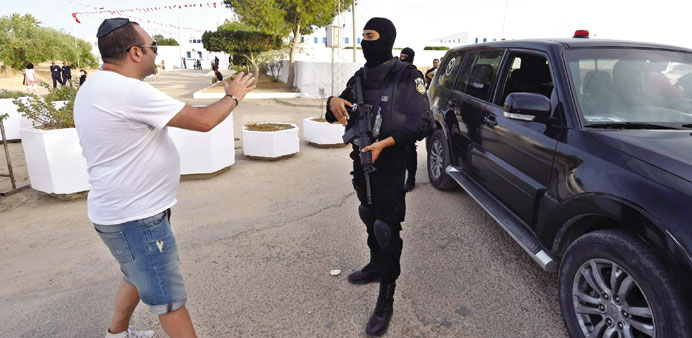A French Jew greets a member of Tunisia’s special forces outside the Ghriba synagogue on the resort island of Djerba yesterday at the start of a two-day annual pilgrimage.
AFP/Djerba, Tunisia
An annual Jewish pilgrimage to Africa’s oldest synagogue in Tunisia began in a festive atmosphere yesterday, despite tight security after the Bardo museum massacre and warnings of planned attacks.
Around 200 Jews joined the pilgrimage on the island of Djerba in southern Tunisia, voicing defiance as they chanted and lit candles at the Ghriba synagogue.
“I could not miss this,” Janet, a 54-year-old Israeli of Tunisian origin, said. “It was important for me to make this pilgrimage, whatever the risks.”
Believed to have been founded in 586 BC by Jews fleeing the destruction of the Temple of Solomon in Jerusalem, the Ghriba synagogue has long been a pilgrimage site, especially for Jews of Tunisian descent.
There were an estimated 100,000 Jews in Tunisia when the country gained independence from France in 1956, but the number has since dwindled to around 1,500.
Pilgrims visit the tombs of famous rabbis for the Lag BaOmer Jewish festival, including on Djerba island, where one of the last Jewish communities in the Arab world still lives.
The number of pilgrims visiting the synagogue has fallen sharply since a 2002 suicide bombing claimed by Al Qaeda that killed 21.
And security is especially tight this year after the March attack on the National Bardo Museum in Tunis, claimed by the Islamic State group, which killed 21 foreign tourists and a Tunisian policeman.
Israeli Prime Minister Benjamin Netanyahu said on Saturday that his country had learned of “concrete threats” of attacks against Jewish or Israeli targets in the North African country, prompting a quick denial from Tunis.
At a news conference on Tuesday, Interior Minister Najem Gharsalli said the warning was unfounded and accused Israel of trying to “damage the reputation of Tunisia”.
Barriers were erected on access routes to Djerba and police checkpoints set up around Hara Kbira, the Jewish district of the island.
“There is a lot of security, there are soldiers and police everywhere and that is very reassuring to us,” said Lorine Bendayan, who made this year’s trip from France.
“Terrorism exists everywhere, you have to be stoic,” said Marc, another pilgrim from France.
Apart from Tunisian pilgrims, organisers say some 500 others are expected in Djerba for the two-day religious festival from France, Israel, Italy and Britain.
Authorities have been struggling to reassure foreign visitors they will be safe in the wake of the Bardo killings, which have hit its key tourism sector that accounts for 7% of the country’s gross domestic product.
Tourism was already suffering from the fallout of Tunisia’s 2011 revolution and organisers say the few hundred Jewish visitors expected for this year’s Djerba pilgrimage are a far cry from the 8,000 or so who made the trip before 2002.
“Before the (Bardo) attack we were expecting a return of pilgrims (to pre-2002 levels),” pilgrimage official Rene Trabelsi told local radio.
“After the attack—and this is only logical and normal—many people are afraid.”

